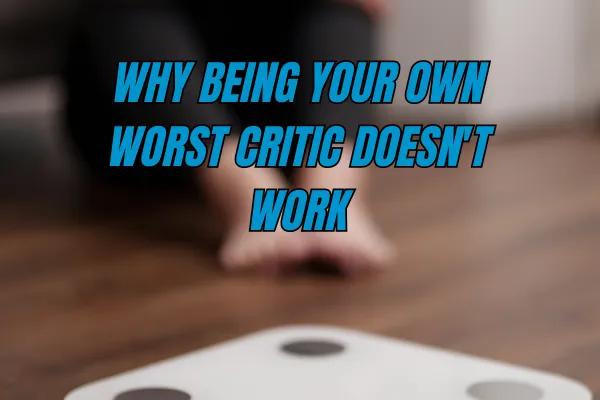WEIGHT LOSS & FITNESS BLOG

Why Being Your Own Worst Critic Doesn't Work
Have you ever caught yourself spiraling into negative thoughts after making a mistake? Maybe you missed a workout, overindulged on the weekend, or felt like you weren’t doing enough. Suddenly, that inner voice kicks in: Why can’t I just be more disciplined? I always mess this up. It’s frustrating, and it feels like the harder you are on yourself, the more you’ll push yourself to be better. But here’s the thing—research shows that self-compassion—not self-criticism—is the real game-changer when it comes to personal growth and motivation.
The Downside of "Tough Love"
Many of us believe that being our own toughest critic will push us to improve. However, studies indicate that self-criticism can lead to negative psychological outcomes, including increased feelings of anxiety and depression.
So how do we know this? Let's talk about how the research was done.
In one study by by Warren and colleagues (2016), researchers examined how self-criticism versus self-compassion impacted motivation. Participants were asked to recall a past failure—something they regretted or felt disappointed about. They were then split into two groups: one was guided through a self-compassion exercise, encouraging them to acknowledge their mistakes with kindness rather than judgment. The other group was encouraged to engage in self-criticism, focusing on what they did wrong and how they could have done better.
The results? The self-compassion group was more likely to take positive steps toward improvement than those in the self-criticism group. Instead of getting stuck in feelings of shame or failure, they felt encouraged to correct their mistakes and move forward. This research challenges the common belief that being harsh on ourselves leads to better outcomes—it often does the opposite.
Another study observed the long-term effects of self-criticism in high-achieving individuals. Over time, those who engaged in frequent self-criticism experienced higher levels of burnout and lower levels of performance, despite their initial motivation. Their inner dialogue was draining them, not helping them.
The Power of Self-Compassion
On the flip side, practicing self-compassion—treating yourself with the same kindness you'd offer a friend—has been linked to greater emotional resilience and motivation. Research by Breines and Chen (2012) found that individuals who practiced self-compassion were more motivated to improve personal weaknesses and rectify moral transgressions.
Self-compassion isn’t just about being “soft” on yourself. It’s about being honest without being cruel. Instead of saying, “I failed, so I must not be good enough,” a self-compassionate approach might be, “I made a mistake, but that doesn’t define me. I can learn from this and move forward.”
This shift in thinking can help reduce stress and anxiety, improve overall well-being, and even lead to better performance in high-pressure situations. Studies show that individuals who regularly practice self-compassion experience lower levels of cortisol (the stress hormone) and higher levels of motivation.
Another important aspect of self-compassion is recognizing common humanity—the idea that you’re not alone in your struggles. When you acknowledge that failure, setbacks, and imperfection are part of the shared human experience, it becomes easier to move forward rather than getting stuck in self-judgment.
And guess what? Self-compassion doesn’t kill ambition. In fact, research suggests it does the opposite. It fuels long-term resilience, motivation, and perseverance because you’re not constantly beating yourself up. Instead of feeling discouraged and giving up, self-compassion helps you stay engaged and keep pushing forward.
What Self-Compassion Is—and What It Isn’t
Let’s clear something up: Self-compassion is NOT the same as making excuses. It doesn’t mean letting yourself off the hook when you mess up or avoiding responsibility. It simply means responding to yourself with understanding instead of unnecessary harshness.
Self-compassion IS:
Acknowledging mistakes while believing in your ability to improve.
Encouraging yourself through struggles rather than tearing yourself down.
Treating yourself with the same kindness and patience you'd offer a good friend.
Self-compassion IS NOT:
Ignoring mistakes or pretending they don’t matter.
Settling for mediocrity or giving up on challenges.
An excuse to avoid effort or accountability.
Think about a great coach you've had in the past. A great coach doesn’t scream at their athlete every time they make a mistake. Instead, they offer constructive feedback, encouragement, and strategies to improve. They hold them accountable. That’s exactly how you should treat yourself.
If you miss a workout or struggle with a movement, beating yourself up won't make you stronger. A good coach will help you focus on progress, not perfection. If you have one bad meal, it doesn’t ruin everything. Instead of spiraling, a great nutrition coach will guide you to get back on track without guilt or shame.
If you slip up on a goal, a coach won’t scold you—they’ll help you identify obstacles and adjust your approach so you can keep moving forward.
Making the Shift
So, how do we shift from self-criticism to self-compassion?
Mindful Awareness: Notice when you're being hard on yourself.
Reframe Your Inner Dialogue: Speak to yourself as you would to a friend facing the same situation.
Embrace Imperfection: Understand that making mistakes is part of being human.
Recognize Common Humanity: Remind yourself that everyone experiences setbacks—it’s not just you.
Practice Self-Encouragement: Instead of tearing yourself down, focus on how you can grow from challenges.
Being tough on yourself might seem like the path to success, but the evidence suggests otherwise. Embracing self-compassion not only enhances well-being but also fosters genuine personal growth. So, treat yourself with a little bit of respect and love. It will do wonders for your life.
References
Breines, J. G., & Chen, S. (2012). Self-Compassion Increases Self-Improvement Motivation. Personality and Social Psychology Bulletin, 38(9), 1133–1143. https://doi.org/10.1177/0146167212445599
Warren, C., Smeets, E., & Neff, K. (2016). Self-criticism and self-compassion: Risk and resilience for psychopathology. Current Psychiatry, 15(12), 18–32. https://self-compassion.org/wp-content/uploads/2016/12/Self-Criticism.pdf


Are you Ready to become
sTRONG - FIT - cONFIDENT?
Click the Button To Start Your Journey Today!!

